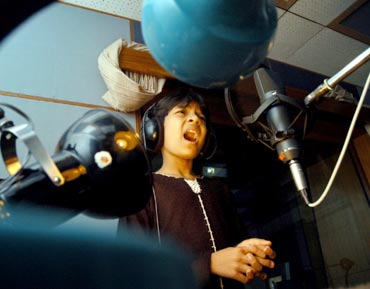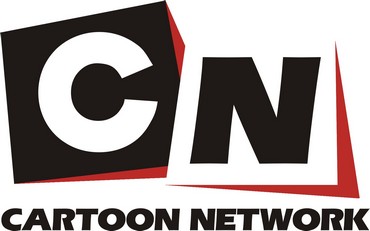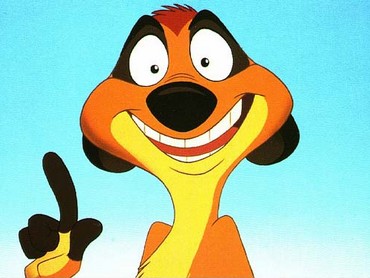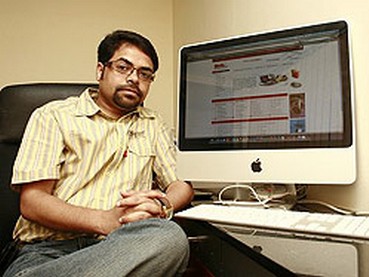
Sanjeet Das, director at Words Infocom (one of India's prominent dubbing and voice production houses in Mumbai), tells Abhishek Mande how you can become a voice-over artiste and busts myths about the industry.
Some voices will probably stay with us for ever -- be it Ameen Sayani on Radio Ceylon, Harish Bimani as Samay in the television show Mahabharata, Chetan Sasithal as the voice of Genie from Disney's Aladin or more recently that of actor Javed Jaffrey in Takeshi's Castle.
With the mass media opening up in India and advertisements and films being dubbed in several languages, voice-over and dubbing are becoming promising careers in their own right.
Sanjeet Das, director at Words Infocom, a prominent dubbing and voice production house in Mumbai that counts Disney, Cartoon Network and Viacom 18 among its clients tells us how lucrative this profession really is and just what it takes to get a foothold in the industry.
How does one go about being a voice-over/dubbing artiste?
Most voice-over and dubbing work that happens in India is restricted to the fiction genre. Non-fiction assignments -- like the Hindi-dubbed documentaries on National Geographic Channel etc -- comprise a very miniscule portion of the work. So what you are looking at is basically dubbing for movies, television shows and advertisements in different languages.
Becoming a dubbing artiste is similar to being an actor in Bollywood. You approach studios in Mumbai and tell them you are a fresh voice. Whenever there is an audition you get a call.
If you are good enough for the project, you get the job. If not, you audition again. You might also get an opportunity to dub for minor characters in the show -- roles that can be restricted to background voices in a movie to a few-lines long character in a television show.
The idea is to work hard at it and lap up everything that comes your way so you can get noticed. Eventually you will get noticed and get a break.
And when does this big break come?
There are two circumstances under which you can get a break -- one is if you sound somewhat similar to any major movie star. If that is the case you become that person's voice in his/her movies when they are being dubbed in different languages.
The other is when you are able to mould your voice to suit different situations and characters. You could then be dubbing for animated movies and serials, advertisements etc. The advertising industry pays the best. If you manage to impress these people, you are set.
Sanjeet Das has worked on over 100 international and Indian films in his career that spans over a decade with companies including UTV and Mainframe.
...

What kind of money can a fresher expect?
It depends on what kind of work you do. The ad industry is more lucrative for dubbing artistes. The pay can be as little as Rs 2,500 or can run into lakhs of rupees. A fresh voice in the ad industry can make anywhere up to Rs 5,000 for a 30-second spot.
The good part about working in the advertisement industry is you get paid whether the ad is edited down to a 20- or even a 10-second spot. Established names are known to earn at least Rs 1.5 lakh for a spot. A successful voice-over artiste usually does two to three ads a day.
If you are dubbing for a film, a fresher earns anywhere between Rs 15,000 to Rs 25,000 to dub for a main character. If you become an established name you can demand up to a lakh. In India there is at least one major film being dubbed every month in different languages.
Can you suggest any voice training courses? Which institutes would you recommend?
In my opinion voice training institutes don't help. What they usually do is provide you with basic know-how, cut a demo CD of your voice and provide some leads, which you could have followed even without having paid them in the first place!
So you don't need a demo CD at all?
No. There are hundreds of them lying in my office and I have never heard a single one! Very rarely do people get the time to listen to the demo CD. The best way is to just visit studios and ask them if there is an audition happening.
And what studios can one visit?
There are a lot of small voice recording and dubbing studios that do voice-overs for regional content in the MHADA area of Andheri. But if it's professional work you are looking at, there are just five good studios in Mumbai. They are UTV, Mainframe, Words Infocom, Ensync and Sound & Vision. You simply need to find out the contact details of these places and can reach out to them directly.
What does it take to become a successful dubbing artiste in India?
You need to be a good actor. As I mentioned before, most work in India is restricted to the fiction genre. Movies, television serials, advertisements keep getting dubbed from one language to another.
Besides, there is a great demand for English language films to be dubbed in Hindi and other local languages. So if you have to dub for say Sean Connery, you should to be able to emote like him. Ads too get dubbed in several languages. Cartoon Network was a bigger hit after it started dubbing its content in local languages.
The point is that you must be able to modulate you voice to suit an actor or a character. If you are doing the voice-over for let's say Winnie the Pooh you must be able to imagine yourself as a bear. Similarly, you got to be able to whistle like Gopher at every 's' sound in a line.
You have to be a good actor to be a good voice-over artiste. And how do you improve your acting skills? You perform on stage. Doing theatre also helps you modulate your voice, emote better and get into the skin of a character. Most dubbing artistes have been actors. Very few of them are successful only as dubbing artistes.
It isn't easy but it is, as far as I know, the only way to become a voice-over artiste.

What makes for a good voice according to you?
A lot of people are under the impression that you need good diction, a great (booming) voice to be recognised. Today there is no such thing as a 'good voice' simply because of the variety of voices that is needed. Someone with a (thin) voice (like mine) can also become a voice-over artiste. Timon (from The Lion King) would be totally up my alley.
What is the career growth pattern after becoming a dubbing artiste?
After you establish yourself as a dubbing artiste, you can become a voice director. A voice director is someone who is responsible for casting artistes. S/he should have an understanding of what kind of voice will go well with what character and must know what will generally work and what won't on the screen.
For instance if one is dubbing an English language film in Hindi, a voice director must know what kind of accents the characters must speak and dub accordingly or tap the industry for the right voice (for say Darth Vader). For this a voice director must know and have access to the talent pool within the industry and be tuned into the market.
After a voice director comes a voice producer. S/he is someone who pays the director to get the work done on the one hand and on the other liaises with the channel to get assignments.
You also have the option of being a freelance voice co-ordinator where you do pretty much everything that a voice director and producer does.
At the very top people can earn anywhere up to a couple of lakhs per month. But that takes a lot of time, patience and persistence. It is a glamorous field. But like it is with acting, there is struggle involved. The rewards are immense however.
Some enterprising and creative people have gone on to become ad film producers. They conceptualise the ad, create characters, get them copyrighted and also do the voice-over -- basically go the whole hog.
How much does a voice producer earn?
About 10 to 15 per cent of the project cost.
How did the recession affect the industry?
We were definitely hit because channels chose to do reruns of old shows and did not dub for new ones. But a year later, work is back to normal.
What has been your most memorable dubbing experience?
I was with Mainframe when 300 came along to be dubbed. The casting for this film was very difficult. To dub for Gerard Butler, after much deliberation, we decided to cast Salim Ghouse, the veteran stage actor. It was a great learning experience to see someone like him dub. That day I knew the difference in casting an actor over a voice-over artiste.
Could you tell us how a film gets dubbed?
After a client gives us a video and the original script, we send the script to be translated. This process takes about a week. Meanwhile the dubbing director or supervisor casts voice artistes. We send two or three voice options from the main cast to the client for the best match. Once the voices for the main cast are finalised, the assistant director schedules the artistes. It takes over 80 to 100 hours to dub a single film. Once the dubbing for the entire film is done we send it to the client for comments. Changes and corrections are made accordingly. After this, it goes to the sound engineer for mixing. The tracks are mixed in the relevant format and that is how the process ends.

Could you name some of the most popular dubbing artistes in India?
No one could do Takeshi's Castle the way Javed Jaffrey did it. It was a hit. His role in (the animated film) Roadside Romeo was fantastic too. Javed can adapt his voice to suit any role.
Chetan Sashithal (who dubbed for the voice of Genie in Aladin) is god. He has dubbed for a lot of stars before they became stars. Today he runs Chatterbox Production, a successful ad film production company.
Ninad Kamat is one of the busiest voice-over artistes in India and quite justifiably so. He is such a refined actor he emotes brilliantly behind the microphone.
Viraj Adhav, who started as a struggling artiste almost ten years ago and has dubbed for John Abraham's first film.
And finally, there is Ella Castelino who does most female voiceovers. She is the voice of Vodafone IVR.
Tips for young aspiring dubbing artistes: